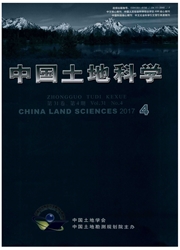

 中文摘要:
中文摘要:
研究目的:分析中国土地供应中的中央-地方分权边界以及激励契约,探索提高有效土地供应的措施以增进土地宏观调控成效。研究方法:应用政策分析、案例分析方法,基于分权理论与激励理论,分析土地供应中的中央-地方关系。研究结果:(1)中央政府与地方政府在土地供应中的权力边界不是固定的,不同权力呈现出不同的分权变化路径;(2)土地供应中的中央-地方关系具有“多任务委托代理”的特征,地方政府倾向于选择执行激励强且易考量的供地任务。研究结论:根据各地的社会经济发展水平以及资源禀赋条件等设立合理的土地供应分权边界是实现有效土地供应的基础;而促使地方政府将中央供地计划落到实处的一个关键是建立和完善约束地方政府供地行为的土地供应“激励契约”机制。
 英文摘要:
英文摘要:
Abstract: The purpose of this paper is to reveal the central-local relations within the land supply system, and then probe into the effective land supply measure for enhancing the performance of macroeconomie intervention. Case study and policy analysis methods are employed. The results indicate that 1) the boundary between the central-local governments relations on land supply is unfixed, and there are different paths regarding different land supply rights; 2) a multi-tasks principal-agent relationship exists between central-local governments in China, and local governments tend to focus on the highly-motivated tasks that can be easily assessed. The paper concludes that the reasonable boundary between central-local governments could be decided in terms of resource endowment. Furthermore, a feasible performance evaluation system together with an effectual incentive mechanism hold the key to a well-established land market and sophisticated land supply system at the local level.
 同期刊论文项目
同期刊论文项目
 同项目期刊论文
同项目期刊论文
 期刊信息
期刊信息
